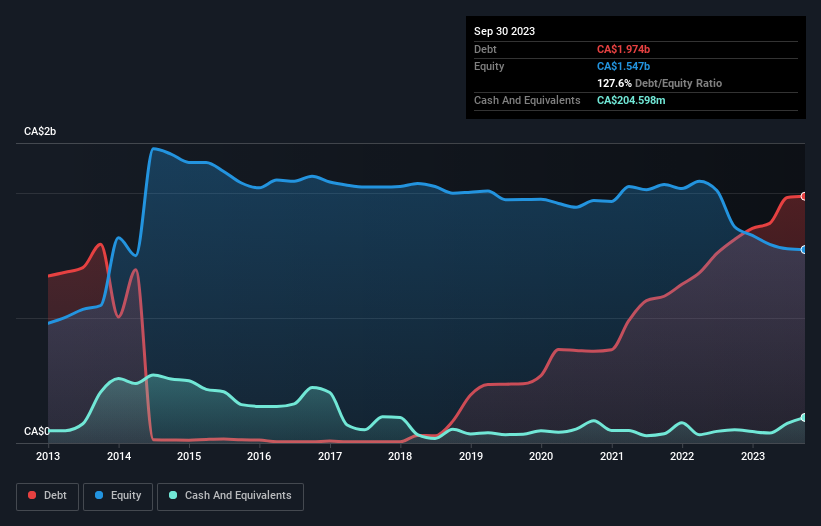Some say volatility, rather than debt, is the best way to think about risk as an investor, but Warren Buffett famously said that 'Volatility is far from synonymous with risk.' So it seems the smart money knows that debt - which is usually involved in bankruptcies - is a very important factor, when you assess how risky a company is. As with many other companies Maple Leaf Foods Inc. (TSE:MFI) makes use of debt. But should shareholders be worried about its use of debt?
Why Does Debt Bring Risk?
Generally speaking, debt only becomes a real problem when a company can't easily pay it off, either by raising capital or with its own cash flow. Ultimately, if the company can't fulfill its legal obligations to repay debt, shareholders could walk away with nothing. While that is not too common, we often do see indebted companies permanently diluting shareholders because lenders force them to raise capital at a distressed price. By replacing dilution, though, debt can be an extremely good tool for businesses that need capital to invest in growth at high rates of return. When we examine debt levels, we first consider both cash and debt levels, together.
See our latest analysis for Maple Leaf Foods
What Is Maple Leaf Foods's Net Debt?
You can click the graphic below for the historical numbers, but it shows that as of September 2023 Maple Leaf Foods had CA$1.97b of debt, an increase on CA$1.63b, over one year. However, because it has a cash reserve of CA$204.6m, its net debt is less, at about CA$1.77b.

How Strong Is Maple Leaf Foods' Balance Sheet?
According to the last reported balance sheet, Maple Leaf Foods had liabilities of CA$1.05b due within 12 months, and liabilities of CA$2.02b due beyond 12 months. Offsetting this, it had CA$204.6m in cash and CA$318.2m in receivables that were due within 12 months. So its liabilities outweigh the sum of its cash and (near-term) receivables by CA$2.54b.
This is a mountain of leverage relative to its market capitalization of CA$3.06b. Should its lenders demand that it shore up the balance sheet, shareholders would likely face severe dilution. The balance sheet is clearly the area to focus on when you are analysing debt. But ultimately the future profitability of the business will decide if Maple Leaf Foods can strengthen its balance sheet over time. So if you want to see what the professionals think, you might find this free report on analyst profit forecasts to be interesting.
Over 12 months, Maple Leaf Foods reported revenue of CA$4.9b, which is a gain of 4.3%, although it did not report any earnings before interest and tax. We usually like to see faster growth from unprofitable companies, but each to their own.
Caveat Emptor
Over the last twelve months Maple Leaf Foods produced an earnings before interest and tax (EBIT) loss. Indeed, it lost CA$1.9m at the EBIT level. Considering that alongside the liabilities mentioned above does not give us much confidence that company should be using so much debt. Quite frankly we think the balance sheet is far from match-fit, although it could be improved with time. Another cause for caution is that is bled CA$126m in negative free cash flow over the last twelve months. So suffice it to say we do consider the stock to be risky. There's no doubt that we learn most about debt from the balance sheet. But ultimately, every company can contain risks that exist outside of the balance sheet. We've identified 3 warning signs with Maple Leaf Foods , and understanding them should be part of your investment process.
If, after all that, you're more interested in a fast growing company with a rock-solid balance sheet, then check out our list of net cash growth stocks without delay.
New: Manage All Your Stock Portfolios in One Place
We've created the ultimate portfolio companion for stock investors, and it's free.
• Connect an unlimited number of Portfolios and see your total in one currency
• Be alerted to new Warning Signs or Risks via email or mobile
• Track the Fair Value of your stocks
Have feedback on this article? Concerned about the content? Get in touch with us directly. Alternatively, email editorial-team (at) simplywallst.com.
This article by Simply Wall St is general in nature. We provide commentary based on historical data and analyst forecasts only using an unbiased methodology and our articles are not intended to be financial advice. It does not constitute a recommendation to buy or sell any stock, and does not take account of your objectives, or your financial situation. We aim to bring you long-term focused analysis driven by fundamental data. Note that our analysis may not factor in the latest price-sensitive company announcements or qualitative material. Simply Wall St has no position in any stocks mentioned.
About TSX:MFI
Maple Leaf Foods
Produces food products in Canada, the United States, Japan, China, and internationally.
Established dividend payer with proven track record.
Similar Companies
Market Insights
Community Narratives



